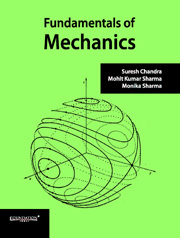3 - Conservation Laws
Published online by Cambridge University Press: 05 March 2014
Summary
A conservation law in the physical world is a consequence of some symmetry. A number of conservation laws exist. Some of them are exact and some are approximate. There are conservation laws pertaining to energy, momentum, angular momentum, charge, number of baryons (protons, neutrons and heavier elements), strangeness and various quantities. In this book, we are mainly interested in the conservation of energy, momentum and angular momentum. The conservation laws are powerful tools because of the following:
Conservation laws are independent of the details of trajectory and often of the details of the particular force.
Conservation laws may be used even when the force is not known. This applies particularly in the physics of elementary particles.
Conservation laws have an intimate connection with invariance.
Even when the force is known exactly, a conservation law may be a convenient help in solving for the motion of a particle.
Elastic and inelastic collisions
Generally, we consider collision between two bodies. A collision between two bodies may be either elastic or inelastic. In an elastic collision, total kinetic energy of the two bodies before collision is equal to the total kinetic energy of the bodies after collision. That is, in an elastic collision, the kinetic energy of the system of bodies is conserved. However, the kinetic energy may be shared among the bodies during collision. On the other hand, in an inelastic collision, the kinetic energy of the system is not conserved.
- Type
- Chapter
- Information
- Fundamentals of Mechanics , pp. 60 - 119Publisher: Foundation BooksPrint publication year: 2014



